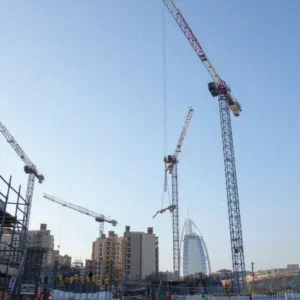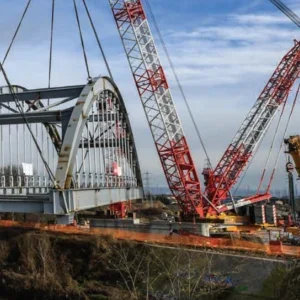He speaks five languages, he has spent the past 23 years in the crane industry working in France, the Middle East, USA, Italy, Singapore and China, and he currently spends half his working life shuttling between international airports. In an industry full of international jet-set travellers, Eric Etchart must be one of the busiest of them all. He is the personification of globalisation, and at a time when Manitowoc Crane Group seeks to complete its global footprint he is the perfect figurehead.
Eric Etchart was born in Bordeaux, France in July 1956. He spent the first seven years of his working life as a professional basketball player with Racing Club de France before, armed with an MBA, joining mobile crane manufacturer PPM in 1983. PPM was at this time still jointly owned by Potain and Poclain. Etchart began in sales, covering the Middle East region before becoming product manager for the new reach stacker product line. Three years later he was put in charge of the reach stacker line. There then followed his first experience of corporate change.
In the late 1980s, Legris Group took over first Potain (in 1987), and then took full control of PPM, buying Case-Poclain’s stake in 1998. The acquisition of Italian mobile crane manufacturer Bendini SpA soon followed and in 1991 Century II, the US manufacturer of P&H cranes, was also acquired. Etchart oversaw the transfer of production of reach stackers to the P&H factory in Conway, South Carolina, and also spent a lot of time in Chicago, working with the distributor Mi-Jack (coincidentally now one of MCG’s largest Grove distributors). With the job done, he was promoted to vice president of international sales of reach stackers and mobile cranes.
His next career move proved significant. Without it, he could have so easily ended up as president of Terex Cranes instead of Manitowoc Crane Group. In 1995 Terex took over PPM. Etchart, however, chose to stay with the Legris Group and transferred to Potain.
His first assignment for Potain was as general manager of Italian operations. He spent two years in Milan that he looks back on with great fondness and felt very at home. “That’s a great country,” he says today. “I was so happy there.”
In 1997, however, then-Potain boss Jean-Yves Bouffault revealed that he had greater plans for Etchart. He had identified Asia as the key market for tower cranes and wanted Etchart to head up Potain’s market presence there. The previous year Potain had signed a joint venture with a Chinese tower crane manufacturer, Linhong, in Zhangjiagang, near Shanghai.
The Asia years
Having already sold her business in France to join her husband in Italy, Monique Etchart and the two boys were on the move again. The family moved to Singapore, base camp of Potain Pte.
Unfortunately the Etcharts arrived in Asia at the very worst time possible. The thriving tower crane market seemed to disappear overnight with a collapse in currency values across the region. Construction ground to a halt. It was a tough time, but Etchart stuck it out and persevered.
Much of his attention centred on the Chinese joint venture. It was losing money and it was obvious that if Potain wanted to realise its ambitions it needed to take total control of the business. It took a year of delicate negotiations with local government bureaucrats before, in April 2000, Potain took 100% ownership of what now became Potain Zhangjiagang. The first task was to reduce the headcount by half, from 700 to a more realistic 350. “That was tough,” Etchart recalls.
Doing business in China is notoriously difficult. Success famously relies on the concept of guanxi, which loosely translates as social connections. It is important to have good relations with the right people. Etchart learned the language, learned his way through the bureaucratic maze, and evidently built up good relations with local dignitaries. The travelling was also hard work, requiring a five hour flight from Singapore to Shanghai every two weeks, and then a drive of several hours to the factory.
He says that the business environment in China has changed a lot since those days. There are now more business-educated people in government, which makes a significant difference.
Meanwhile there was change afoot in Europe too. In May 2001 Potain was taken over by Manitowoc; in 2002, Grove was added to the fold. Etchart was appointed executive vice president of the newly formed Manitowoc Crane Group, with responsibility for Asia. With the Chinese factory now the focus of these operations, Etchart and his family relocated to Shanghai in 2002, although he continued to spend half his life on airplanes flying not just around Asia, but to corporate meetings on the other side of the world.
|
“India, Brazil, Russia – these are countries that, if you aim to be a global player, you have to ask, can you afford not to be there” |
|
Eric Etchart, CEO, Manitowoc Crane Group |
The Chinese factory was soon turned around to profitability, for which he credits the team around him. “I was surrounded by very good people,” he says. “Since 2002, thanks to very good market conditions, we have grown the business.”
By 2004 the Zhangjiagang factory was working two and three shifts and at full capacity. Manitowoc agreed to the development of a new factory on a nearby greenfield site. “We put it up in less than a year, at the right cost and the right time,” Etchart says.
After an inauspicious start to his 10 years in Asia, Etchart has ended on a high. He says that his personal goal was to remain in China until at least 2012 to see out the attainment of targets that he had set for that year. However, in April this year, further promotion came his way when he was appointed president of MCG. Etchart is planning to move to Manitowoc, Wisconsin, in October to base himself at the head office. “It is impossible to run the cranes group from Asia,” he says.
Plans for the presidency
Etchart takes over from Glen Tellock, although Tellock will remain his boss. After five years as president of MCG, Tellock has returned to the corporate head office. Tellock had previously been chief financial officer of parent company The Manitowoc Company Inc. in the late 1990s, and after gaining operational experience heading the company’s largest division (cranes account for 79% of group turnover) was now perfectly groomed to take over as group CEO from Terry Growcock. Thanks, at least in part, to perfect timing, 46-year-old Tellock leaves the crane group with his reputation very secure. He arrived in 2002 when the Potain and Grove acquisitions had boosted annual sales from $275m to $724m. In his last complete year in charge, 2006, sales topped $2.2bn and are on course for $2.7bn this year.
For Etchart to match this extraordinary growth is extremely challenging, if not impossible. How does he plan to do it? “Coming from the sports community, we say you don’t change a winning team or a winning strategy,” he says. “Glen has done a brilliant job. Of course, he is my boss so I cannot say differently, but I genuinely believe he has.”
Tellock’s core achievement, Etchart believes, was in changing the culture of the company to one where “people are ready to embrace new challenges”. He also managed the integration of the different strands from Manitowoc, Grove and Potain around the world: Perhaps his greatest legacy was making it possible for a Frenchman to take over as head of a US company in Wisconsin.
Although proud to have been born in France, after so many years working overseas and having been exposed to so many different cultures, Etchart is a true cosmopolitan, a citizen of the world. His whole career has been involved with the globalisation of the crane industry. “I was in a meeting this morning with 20 people in the room and there were nine different nationalities,” he says. He speaks French, English, Italian, Spanish and Mandarin (He also used to speak Arabic in his PPM days but lost it through lack of use).
Who better, therefore, to continue the development of MCG from an international to a global company? This will remain MCG’s central strategy, he says, along with product innovation, customer focus and promoting the Crane Care service operation to differentiate MCG from its competitors.
He has been in the industry long enough to know that the market will surely slow at some stage, although probably not until at least 2009, when he predicts a soft landing. “I am not pessimistic,” he says. Globalisation and the emergence of new markets will make the market cycle different from past ones, he believes. There is a huge amount of infrastructure to be built all around the world, with countries such as China and India continuing to develop rapidly. Manitowoc protects itself by its geographic spread.
In this quest for greater globalisation, might MCG begin producing mobile cranes in China, or acquire a Chinese manufacturer of mobile cranes? “We are looking at opportunities around the world, not only in China,” he says. “There are other countries that come to mind.”
Like India? He responds: “India, Brazil, Russia, these are countries that if you aim to be a global player: you have to ask: can you afford not to be there?”
It looks like Eric Etchart will be continuing to rack up the air miles for a few more years to come.
Eric Etchart, CEO, Manitowoc Crane Group The up-and-coming economies
India, Brazil, Russia – these are countries that, if you aim to be a global player, you have to ask, can you afford not to be there
Eric Etchart, new president of Manitowoc Crane Group Eric Etchart





